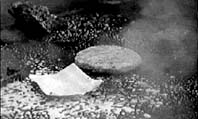
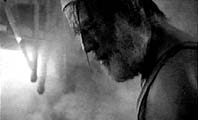
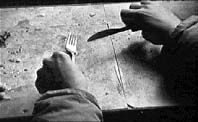
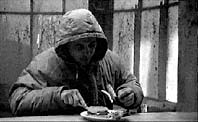
Person 1: "I was eating out last night."Person 2: "Oh, where did you go?"
Person 1: "I sat by the Interstate."
This dialogue could have been printed on the back page of the Danish newspaper Jyllands Posten Sunday under the headline "Jokes". But why is it (or is it supposed to be) funny? What happens in the dialogue? Person 1 invites Person 2 to take part in a language game, Person 2 accepts, but is cheated, because Person 1 takes the term 'eating out' in its literary sense.
When the obvious is being sabotaged, attention focuses on the obviousness of the obvious. So what is obvious in the expression 'eating out'? It is not that you sit outside eating. On the contrary. It is that you eat in a restaurant (i.e. in a nice place), that you eat in a proper way (with knife, fork and a napkin), that you are shown the menu and probably receive recommendations. You might be invited (at least you often eat with somebody), you make conversation (you might even be flirting), there is music (and not muzak) in the background, and you are dressed up.
Eating Out does take its title in the literal sense, but at the same
time it is pure irony. And in a very subtle way-because it is underacted into
the naive.
In the first shot a fast-food burger is slashed right into our faces, next a sweating cook in a dirty vest, afterwards an industrial formed slice of cheese, and thereafter an indeterminable ball of sludge is splashed all over.
On a dirty counter a pair of hands arrange a knife and a fork in parallel with a space left for a plate. Later the same pair of hands meticulously shove a portion of french fries aside.
 |
 |
 |
 |
The cook tunes the radio in to opera music.
The gestures are appropriate, but the content is grotesque. The Parka is 'eating out', but the restaurant is not a restaurant-it is a miserable diner. The food is not French style, but fast-food. The cook is not 'haute cuisine', but untidy and sweating. The table is not with a cloth, but a dirty counter. The clothes are not 'comme il faut' but a Parka coat, and though the music is 'high culture', it comes from a grating radio.
In spite of this the Parka insists on form. On knife, fork and napkin. And it is possible because the cook-though apparently unwittingly-joins the game.
A man and a woman enter. The man (who later turns out to be called Roy) points a gun hidden under a newspaper and yells: "Give me the money."
The cook does not hear him so Roy motions to the radio and tries feverishly to turn it off. As he has no success, he ends up smashing the radio into the counter. He repeats: "Give me the money!" But the cook is busy-he says. Obviously he is not because no one is there. The line just refuses to acknowledge the robbery as a robbery.
And yet. The cook seems to be doubting. Standing in front of Roy, who just demanded money, the cook takes a glance at Julie and the Parka who-seemingly unaffected-are doing something else, and thereby do not acknowledge the robbery either. Subsequently he (the cook) removes a stack of dirty plates from the counter.
And yet. The cook begins to take money from the cashfill.
But Julie is hungry. The Parka recommends "Number 37", because it has "abundance and consistency."
The cook watches with astonishment.
Roy tries to continue his robbery, but how can he continue when nobody wants to play? The Parka is playing another game: He is eating out. Julie wants that too. The cook is playing a double game (without actually playing anything). "The burger first and then the money, or the other way around?" he asks, as Roy is desperately seeking to comply with Julie's demand for food. And: "Didn't you want the money?" as Roy runs off (the sound of police sirens in the background).
The cook stands the radio upright, and Julie gets her burger. She is eating out, though she is not quite familiar with the rules. When she grabs her burger with her fingers, the Parka discretely pushes a knife and a fork towards her, and when she snorts, he wipes her nose with his sleeve. And that's it: the Parka says "Cold!" and offers that Julie can lean against his Parka coat. So she does.
Eating Out is a point-of-view-type film. Throughout the film four persons are situated in the immediate vicinity of the counter that separates the kitchen from the 'restaurant'-three on one side, one on the other. When the camera does not take the explicit point of view of Julie, Roy, the Parka or the cook, it moves horizontally along the back wall of the kitchen. Though no point of view is established, the camera is situated where the cook would have been. Hence the universe of the film receives a theatrical character, and an absurd play is performed.
The absurd is a relationship, namely the relationship between the expectation of sense and its absence. It makes no sense 'eating out', when the restaurant is a miserable diner, the menu is fast-food, the table is a filthy counter etc. It makes no sense to 'learn' how to eat a burger with knife and fork, or to keep out the cold by leaning against a Parka coat. And neither does it make sense to commit a robbery, when the cashfill is almost empty and you don't even know how to behave (as a robber).
But something is given sense.
Despite the fact that the concept is strained to the breaking point, I will
call this film post-modern. What has sense is what is acknowledged as having
sense. And the matter is determined by-'taste'.
In the absurd theatre of Eating out, the viewer's position is inscribed by the cook. As the cook is doubting, so is the audience (or the other way around): What is going on?
Two language games compete: Roy's and the Parka's. Both insist - Roy on content, the Parka on form. The Parka wins, because Roy doesn't understand about form. He allows himself to be distracted by a radio, by Julie's demand for food, by a cook who won't play and by a police car, that most likely is going somewhere else (but the sound of sirens is enough). Had Roy actually been the king his name indicated, then the cook would have had a hole in his chest, which he in one take (Roy's point of view) seems to have. But it is only ketchup.
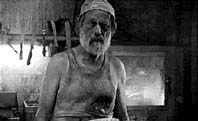 |
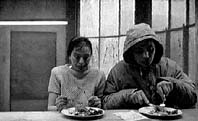 |
In a post-modern matter of constitution of meaning, Julie meta-inscribes the viewer: What has sense is what is given sense. The matter is determined by 'taste'. An unappetizing burger has value, because aesthetic value ("it has abundance and consistency") is ascribed to it. The ritual 'eating out' has value, but as (the performance of) pure form.
So in a filthy and cold 'world' where even a miserable diner is exposed to robbery, something remains-namely the form.